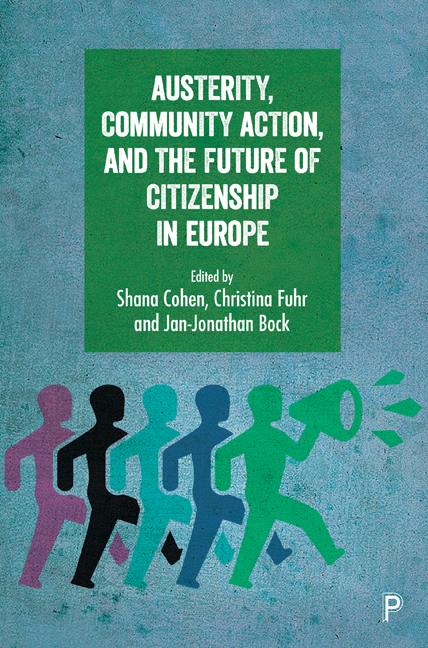Book contents
- Frontmatter
- Dedication
- Contents
- Acknowledgements
- Notes on contributors
- one Introduction: social activism, belonging and citizenship in a period of crisis
- Part I The social consequences of welfare policy
- Part II The practice of social good
- Part III Social change and neoliberalism
- Part IV Situating solidarity in perspective
- Index
Ten - Helping the homeless: a soup kitchen in London
Published online by Cambridge University Press: 05 April 2022
- Frontmatter
- Dedication
- Contents
- Acknowledgements
- Notes on contributors
- one Introduction: social activism, belonging and citizenship in a period of crisis
- Part I The social consequences of welfare policy
- Part II The practice of social good
- Part III Social change and neoliberalism
- Part IV Situating solidarity in perspective
- Index
Summary
Muswell Hill is a neighbourhood in north London, identified by The Sunday Times as one of the five best places to live in London. It is known as the village on the hill. It has large, beautiful Edwardian houses, great views across the capital, exciting shops and restaurants. Muswell Hill is thriving socially and economically. The state schools have received ‘outstanding’ status, and there is a high demand to live in the catchment area of each school. It is a settled community, where many people have lived all their adult lives. There are 11 well-established churches and a thriving synagogue. These are communities within the community, but they still have a common social conscience, which often produces social action. One local example of this is the Muswell Hill Churches Soup Kitchen for the Homeless. It is strongly supported by all the faith groups and is hosted in Muswell Hill Baptist Church.
In 1994, a few people from the Baptist Church invited local homeless people for a warm evening meal. The volunteers cooked food in their homes and brought it to the church. The guests appreciated the gesture, and soon an established group of about 12 were eating at the church five evenings a week. Over the years, the project grew to offering 25 meals every evening. It thus became necessary to cook food on the premises. Appeals were made for help to other churches in Muswell Hill, and soon different churches were responsible for serving food different evenings each week. The local churches organised volunteers and provided the food. Much of it was generated by harvest festivals, and soon thousands of cans of beans and soup were arriving each October. This non-perishable resource enabled the soup kitchen to serve about 10,000 free meals per year (writing in 2016). Over time, our soup kitchen became widely known, and even schools and other community groups started donating non-perishable food.
This broad recognition is also reflected in our voluntary base, which is quite diverse. We attract volunteers from different faiths and nonfaith backgrounds, across ethnic and age groups. Even companies have started sending us their employees to volunteer as part of their social responsibility initiatives.
- Type
- Chapter
- Information
- Austerity Community Action and the Future of Citizenship , pp. 157 - 168Publisher: Bristol University PressPrint publication year: 2017



